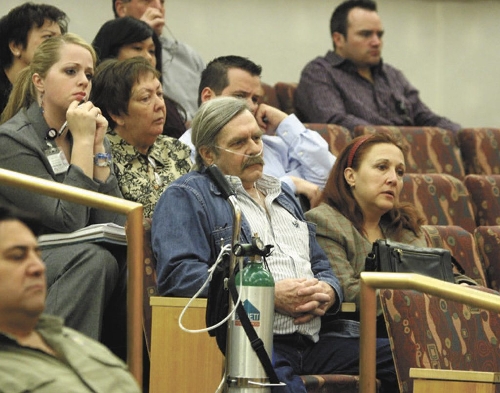Commission looks at declaring emergency for medical aid programs
Trudging slowly, a gray-bearded man rolled an oxygen tank to the podium and pleaded for his life.
"I'd like to live another year until I can qualify for Medicaid," Richard Weber told Clark County commissioners Tuesday.
Weber is among the 2,100 residents who could be bumped from the county's medical aid programs.
These programs face a $13 million shortfall this year and $11 million in the next budget year because of falling property tax revenue. That's not counting the money the programs could lose if the Legislature grabs revenue from the county to help fill the state's budget gaps.
Funding has shrunk to $55 million from $75 million last year and is expected to dip to $44 million in the coming year. Service must be reduced, or current funds will run out by July, said Nancy McLane, social services director.
The most devastating blow would be to home-care patients like Weber who suffer from severe ailments that prevent them from breathing without an oxygen device, feeding themselves or doing other basic physical functions. To survive, they might have to turn to institutions, where space is less available because of the growing number of poor patients in the tough economy.
Commissioners were moved by the patients' plight.
They are looking into declaring a state of emergency to bypass a spending cap on social services.
A 40-year-old state law forbids social services from diverting money from other county programs to boost its normal budget, except in an emergency. The restriction was passed to curb spending on social programs. The agency receives 30 percent of the countywide tax, charged to all property owners.
County Counsel Mary-Anne Miller said the agency's financial troubles don't qualify as an unforeseen disaster and, thus, can't be deemed an emergency.
But some commissioners said they were willing to test the law. They will decide at a future meeting whether to declare an emergency.
"This is not about entitlement," Commissioner Larry Brown said. "It's about true human need. I just don't see many things that are more important than what we've heard today."
About 7,000 people qualify for county medical care, their ages ranging from 18 to 101 years old. They are near or below the poverty line, and most don't qualify for Medicare or Medicaid.
McLane proposed policy changes to shave costs. Aside from providing home service, the funding covers some patient care, burials and cremations and one-time financial aid to the elderly.
The most significant change would be toughening eligibility for patients.
McLane suggested disqualifying those who earn more than 118 percent of the federal poverty level. That would be $1,065 monthly for one person and $1,433 for a two-person household, a limit similar to Washoe County's, she said.
Income caps are now $1,435 for one person and $1,925 for two people.
Deciding where to cut next has become increasingly difficult now that the agency is down to the bone, McLane said.
Commissioner Steve Sisolak sympathized.
"We're beyond cutting numbers -- we're cutting people," Sisolak said.
Regional medical programs like these serve all residents, so the county shouldn't have to make the tough decisions alone, Sisolak said, adding that the cities need to take part.
Two years ago, the state took 4 cents of the county's 44.7 cent tax rate, slicing into social service funding. This year, Gov. Brian Sandoval has said the state might divert 9 cents from the county's tax rate.
Commissioners agonized about how to preserve medical service for the poor, but they soon could be faced with making deep cuts in a long list of services, county spokesman Erik Pappa said. "This is a preview of what you'll see if the state takes money from the countywide tax rate."
Removing patients from home-care service will force some of them into institutions and escalate taxpayers' costs, said Trace Wolf, administrator for Helping Hand, an in-home care provider.
Wolf estimates that tending to patients at home costs $100 to $120 per month, whereas nursing homes are reimbursed as much as $189 per day from Medicaid.
"If we continue to eliminate solutions, where will Nevadans be?" Wolf said.
Commissioner Chris Giunchigliani said the county was scraping low to make ends meet.
"To me, it would be morally reprehensible taking two hours a week (of care) from a 101-year-old man who needs bathing," Giunchigliani said.
Weber also could be left in limbo, a friend of his told commissioners Tuesday.
He will be old enough to receive Medicaid in October. Until then, he needs medical aid from another source, Susan Riley said. "We all need to think about this and pray about this, because he's not the only one."
Contact reporter Scott Wyland at swyland@reviewjournal.com or 702-455-4519.

















